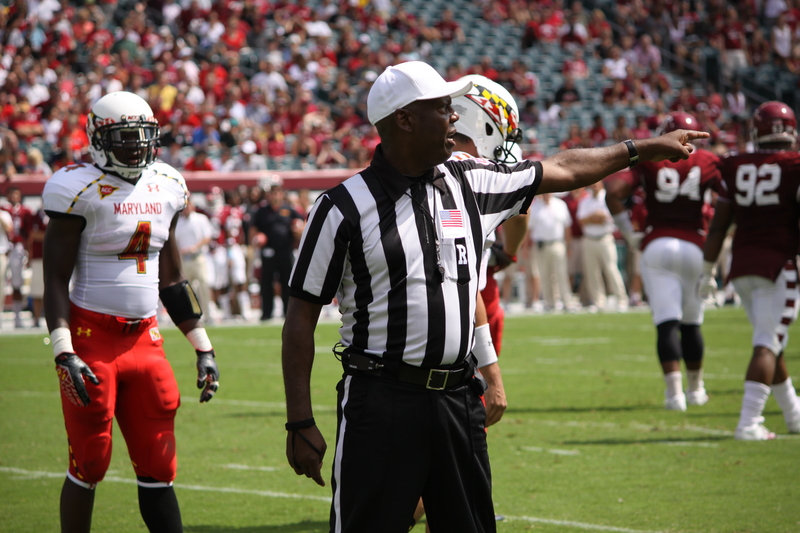Last updated on October 28th, 2023 at 09:13 am
An unsportsmanlike conduct penalty in the NFL and college football is a non-contact foul. It occurs when a player goes against the general rules of sportsmanship—usually occurring during moments of intense passion or frustration in the game. This penalty can be a game-changer because the other team receives a 15-yard penalty, and the player who commits the foul might even serve a game suspension and receive a financial penalty.
What is the Penalty for Unsportsmanlike Conduct in Football?
In football, the penalty for unsportsmanlike conduct is a 15-yard penalty. The 15 yards would be applied to the ensuing kickoff if this foul occurred after a scoring play.
Under the unsportsmanlike conduct rule, a player or coach might also receive an ejection from the game after one of these calls. For example, a player or coach showing aggression to officials or other players can receive an ejection from the match.
Finally, a player receives a financial fine that they have to pay after this penalty in the NFL. According to Boardroom, the first offense gets a $13,261 penalty, while the second is $18,566.
What are Some Examples of Unsportsmanlike Conduct?
Unsportsmanlike conduct penalties can occur after any number of infractions. Some of the more common examples of when a player could get flagged for unsportsmanlike conduct are when a player is aggressively arguing with a game official, taunting of any degree, excessive celebration, or baiting. Other examples can include players being overly aggressive with each other.
For example, a linebacker charges into a lineman during the play to get a tackle. An unsportsmanlike conduct penalty would occur if the lineman were to hold onto the linebacker and drag them to the ground well after the ball had already left the line of scrimmage.
Head coaches can also receive unsportsmanlike penalties during a game. One way they can receive this penalty is if they become overly aggressive with the referees after a call. Another example of when they can receive this penalty is taunting an opposing player.
How Often Do Unsportsmanlike Conduct Penalties Occur in an NFL Regular Season?
According to NFLpenalties.com, there were .31 unsportsmanlike conduct penalties per team during the 2023 season.
- 2022: 1.25
- 2021: 1.31
- 2020: 1
Can Unsportsmanlike Conduct Take Away a Touchdown?
In college football, if an unsportsmanlike penalty occurs after a team score a touchdown, the touchdown is rescinded, and the offense team starts from 15 yards back.
However, in the NFL, the same rule does not apply. Instead, if an unsportsmanlike penalty gets called, the touchdown will stand, but the opposing team will have the option of enforcing the 15-yard penalty on either the kickoff or the extra point.
Conclusion: What is Unsportsmanlike Conduct in Football?
The unsportsmanlike conduct penalty is one rule that maintains some sense of professionalism in a game. Players getting out of line or committing an unfair act can lead to an unsportsmanlike call, resulting in a 15-yard penalty or an ejection if it happens twice to the same player. It can come from taunting your opposing team to yelling extensively at a referee during a game.
Finally, unsportsmanlike conduct calls in college football add the removal of a touchdown if that occurs during that play. For example, a game between Harvard and Yale had some taunting as a player approached the endzone. What initially went in as a touchdown was reversed since the referees saw the taunting with the offensive player.
Similar Posts:
What Does the ACC Mean in College Football?
Offensive Coordinator Football
What are Bowl Games in College Football?
Who Invented American Football?
How Does Overtime Work in College Football?
How Much Do College Football Coaches Make?
Defensive Coordinator Football
What is Encroachment in Football?
What is a Hail Mary in Football?
Greg Kristan, owner of The Stadium Reviews, LLC and TM Blast, LLC, brings his extensive experience visiting over half of the MLB ballparks, along with numerous MLS, NHL, NBA, and NFL venues, to provide in-depth coverage on the bag policy, food options, and parking. He has also been interviewed about his experiences on several sports podcasts.






